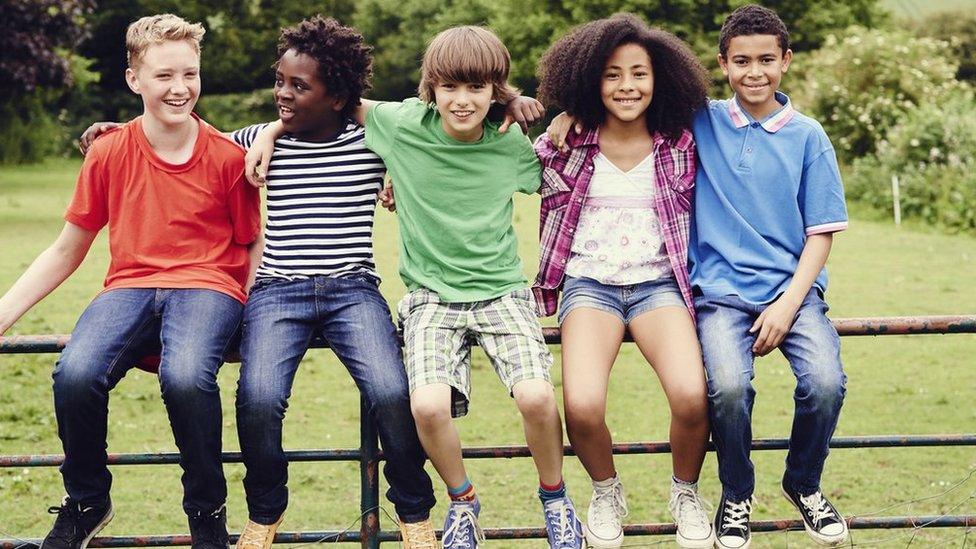'The Big Ask': Kids in England to have their say on childhood
- Published
- comments

Millions of children in England are to be given the chance to tell the government what their childhoods should look like.
'The Big Ask' will find out from kids what life is like for them, what hopes and aspirations they have for the future and what challenges they face in reaching their goals.
The survey is being led by the Children's Commissioner for England Dame Rachel de Souza, who thinks it is important to look at the impact of the coronavirus pandemic on children's lives.
England and Manchester United footballer Marcus Rashford is supporting the project and will hold an online assembly for kids about it.
Dame Rachel de Souza took on the job of Children's Commissioner in March 2021. At the time, she promised to raise the issues affecting young people with the Prime Minster, Boris Johnson
Dame de Souza said she wants what is said in the survey to "tackle some of the generational problems that have held back too many children for decades."
She said: "It is time to give something back to children after the huge sacrifices they have made during the Covid pandemic."
"I want 'The Big Ask' to be the biggest survey of children ever carried out in this country, so that we can better understand what children want from the people in power and those who make decisions about their lives", she added.
What is 'The Big Ask'?
The Children's Commissioner for England is independent from the government, and it is her job to help improve opportunities for young people across the country and stand up for children's rights.
One of the ways this can be done is through helping to shape the government policies that affect children's lives, particularly the most vulnerable.
Dame de Souza says the survey is 'a once in a generation review of the future of childhood' and the results will provide the government with a blueprint or map for childhood, to help all kids thrive and identify any obstacles they face.
The survey can be filled in online
It is hoped the views shared by children in England will help shape the way the government approaches issues affecting kids, not just for this generation, but for all the children in the decade to follow.
They say they want it to inspire positive changes, similar to those made in the 1940s as a result of William Beveridge's report and the introduction of benefits for those most in need.
This survey will run from April 19th to May 19th and will ask children across England to set out their priorities for improving childhood following the pandemic.
There are four main versions of 'The Big Ask' survey, aimed at children in the age groups 4-5, 6-8, 9-12 and 13-17.
In 1941, politician William Beveridge set out to discover what kind of Britain people wanted to see after the war.
His report was a key part of the plans to rebuild and improve Britain after the war had ended.
He identified key areas affecting people's lives: Want, Squalor, Ignorance, Disease and Idleness
To tackle these so called 'evil giants' a welfare system was suggested, to support people in need from 'cradle to grave'.
Just under half (49%) of children said they felt "worse than usual" during lockdown
Why is it important?
The covid pandemic has been a challenging time for everyone, but some children have faced bigger challenges than others.
The full impact that lockdown, social distancing and home schooling has had on children is now being seen.
Being at home more with parents and guardians, and spending more time together with immediate family, was obviously a nice change for some. But many others had a different experience.
Coronavirus and UK Children: How do you feel about lockdown?
A recent Newsround survey found that just under half (49%) of kids said they felt "worse than usual" during the lockdowns. And that number rose for girls (51%) and for older children (53%).
The Children's Commissioner says that now is a 'pivotal' moment for England to understand how the lockdowns have truly affected children and how all young people can now be best supported to 'reach their full potential'.
How can you get involved?
'The Big Ask' will be online until May 19th and is available to all kids who can access the internet.
You may notice that you have an assembly about it or your teachers discuss it with you too.
It will be made available through schools, youth groups, local authorities and charities who work with children and young people.
Children in Care Councils, children's homes, children's mental health services, youth justice settings, community groups and others will also be encouraging kids in England to take part.
The survey is completely anonymous, which means you cannot be identified or linked to your answers.
Dame de Souza will be visiting schools all over England to talk about it too.
- Published22 March 2021
- Published5 November 2015
- Published4 June 2019
